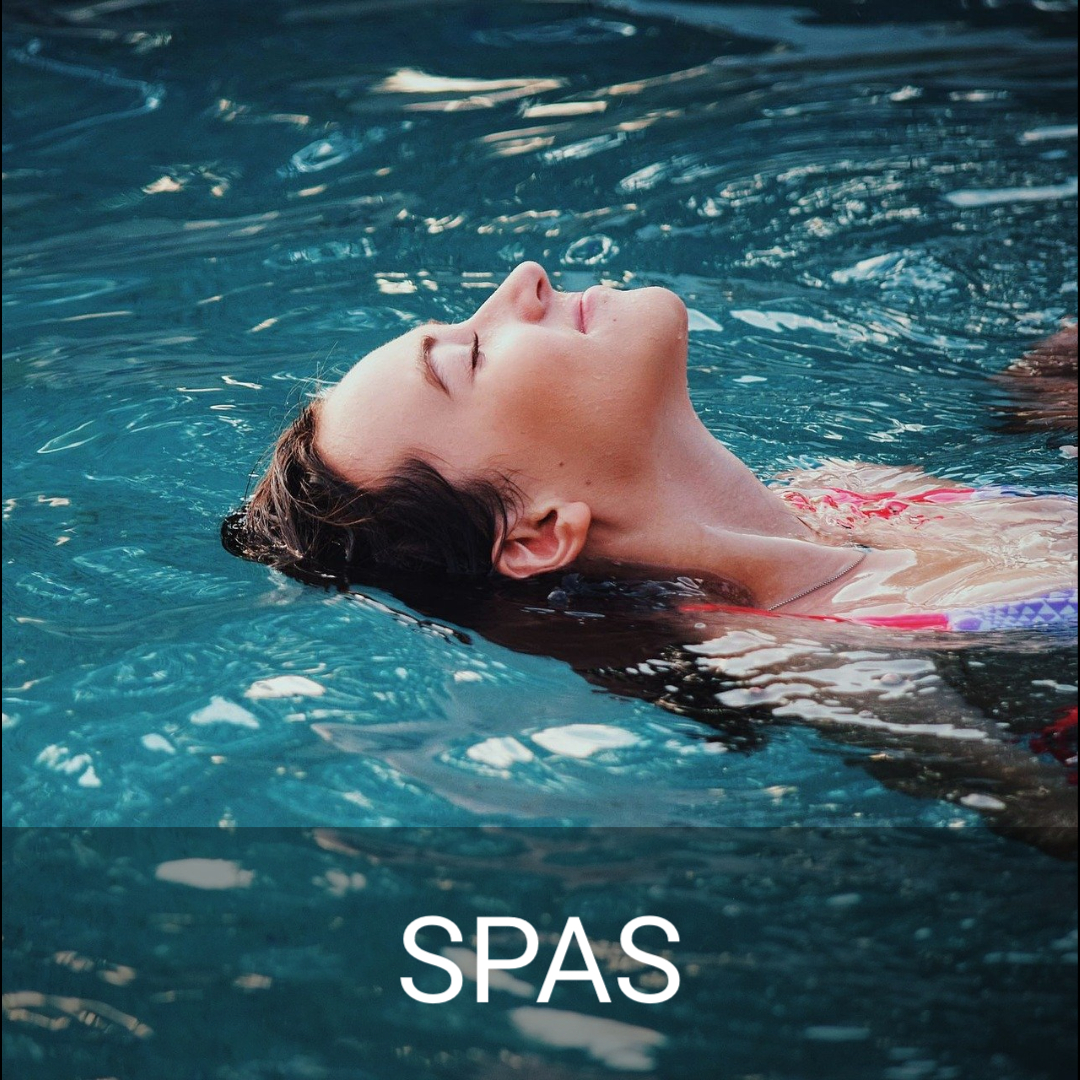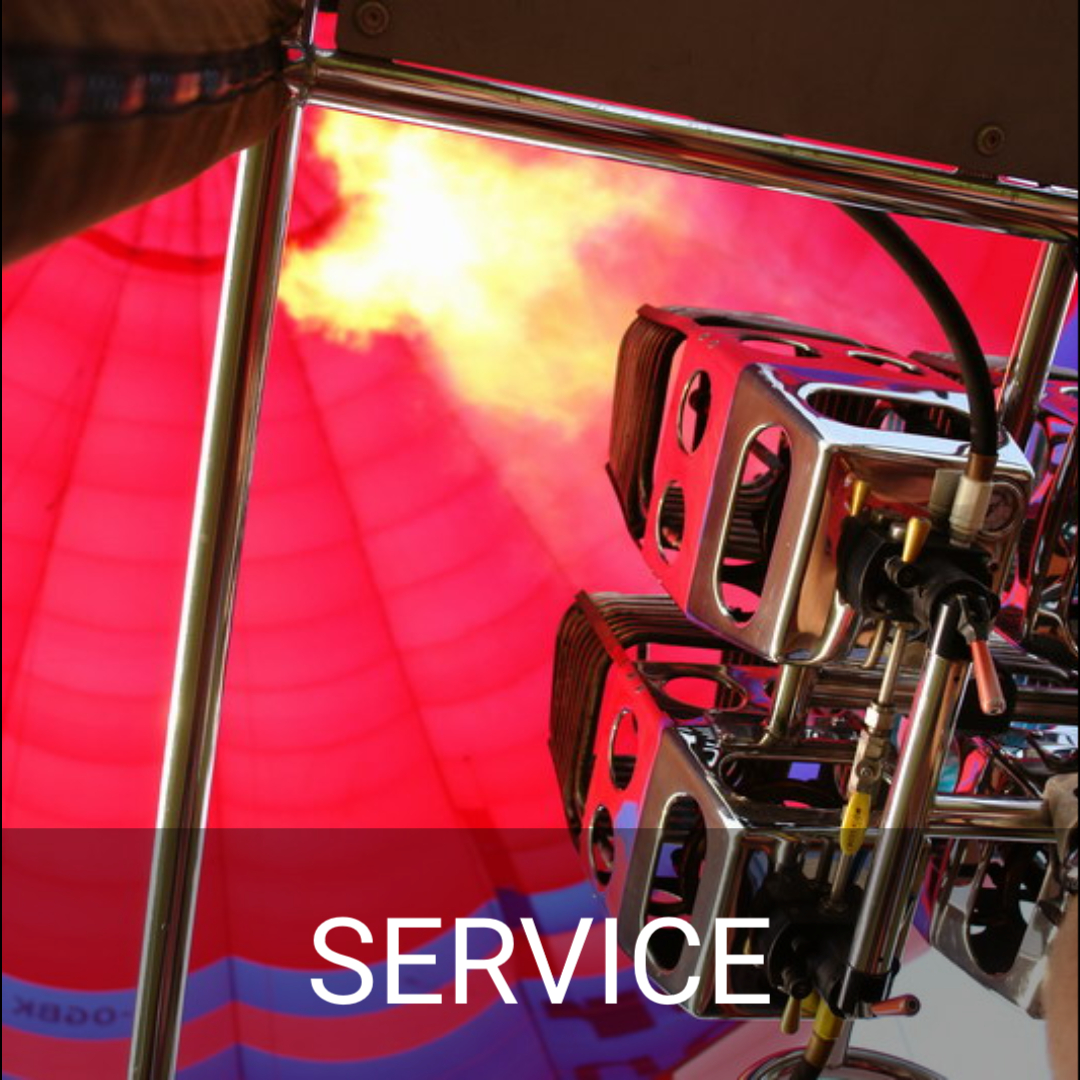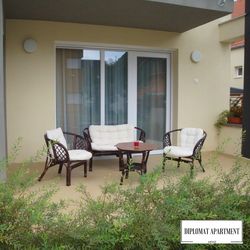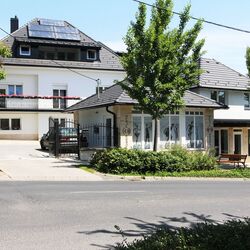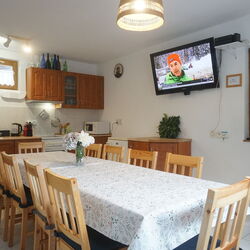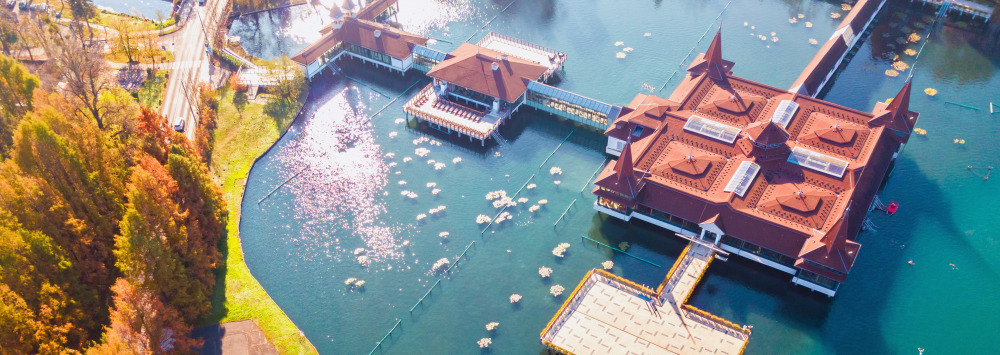
Imagine a peaceful, tranquil place surrounded by lush green forests, where everything is about relaxation and recuperation, where you can bathe in caressing turquoise thermal water among colourful water lilies in the world's largest peat-bed spa lake, where the only thing that matters is you, and where everybody is at your beck and call. This dream world becomes real in Hévíz.
The thermal lake of Hévíz, which refreshes both body and soul, is the largest biologically active natural thermal lake in the world.
The lake covers 4.6 hectares or 46,350 m2 to be precise and has a spring of 38.5 metres in depth. The lake is fed by a spring rich in sulphur, radium and minerals. Thanks to its abundant water supply, the water of the lake is completely replaced within 72 hours. The waters of Lake Hévíz are equally rich in dissolved and gaseous substances, combining the beneficial properties of carbonic, sulphurous, calcium bicarbonate, magnesium bicarbonate waters. The surface of the lake could accommodate up to six and a half football pitches. The water flow is about 410 litres per second. The upwelling hot water is around 40°C, but depending on the time of year and the weather, the temperature on the surface is around 24°C on the coldest days and can reach 38°C in the summer months.
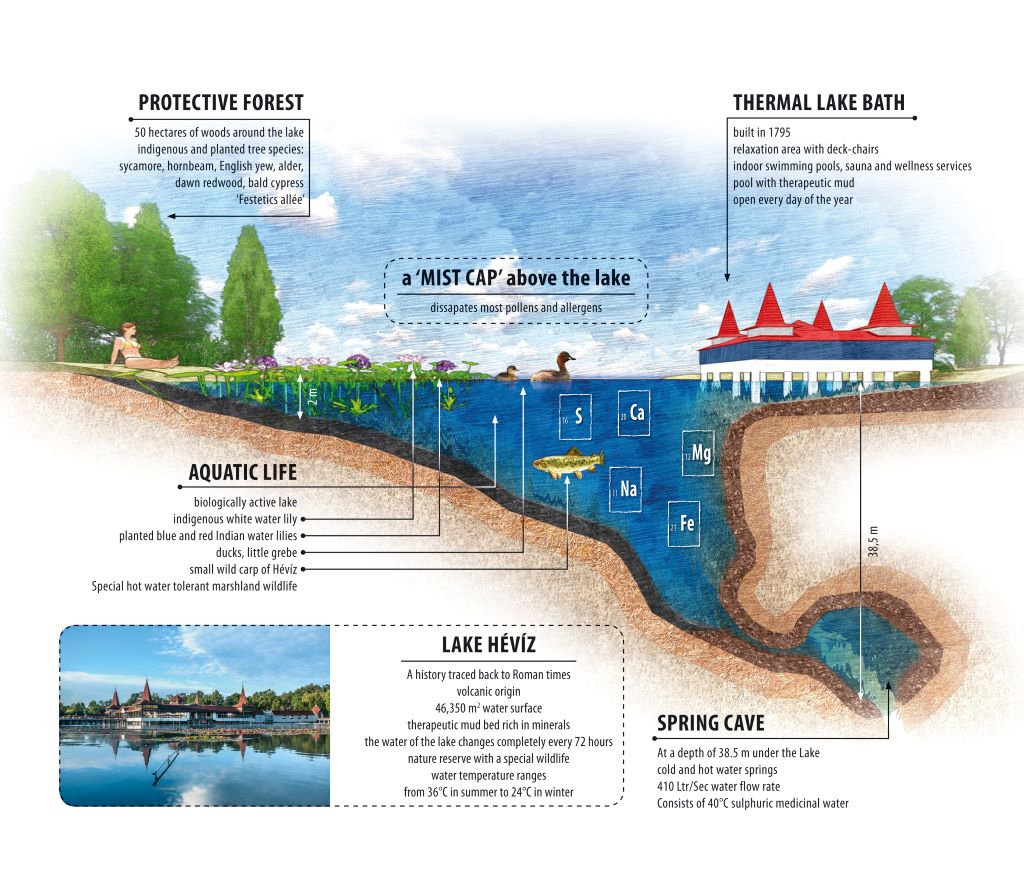

Why wasn’t the spring discovered earlier?
The water in Lake Hévíz is extremely clear, and you can still see the bottom at a depth of around two metres. This was not always the case. In the early days, Lake Hévíz was far from being a lake with such a controlled bed and shore. Rather, it was a lake in the middle of a marshland, full of peat, sediment and alluvium. Floating peat was densely present in the water, and the bed and crater were covered with several metres of sediment and alluvium. This made underwater orientation and diving difficult. The water is clear today because the baths burned down in a fire in 1986 and parts of the building fell into the lake, as a result of which the entire lake bed had to be cleaned and dredged.
The discovery of the cave
As early as the 18th century, attempts were made to locate the spring and to assess how deep the lake might be. Deep-divers went deep into the lake several times but this technology had not yet made it possible to find the deepest point of the lake and its spring.
In the 1970s, however, dives became more regular, the quality, temperature and yield of the water were constantly being studied, and several attempts were made to find the spring. Finally, on 10th February 1975, scuba divers István Plózer and Lajos Csávos found the spring under a very detrited stretch of the lake bed, which turned out to be the entrance to an underwater cave.
They found a passage of about 60*80 cm, leading into a long, narrow corridor. Overcoming the strong head-on thermal water flow, they entered the cave room. They later found that the passage was about 4 metres long, and the cave was 17 metres in diameter and 14 metres high with arched walls all around. The cavern was divided by a layer of mud at a depth of 40-41 metres with cold water of 17.2°C rushing up from a crater on the eastern side (which disappeared in the second half of the 1980s) and thermal water of 41.3°C welling up from a crater on the western side at a depth of 45-46 metres. The cave is home to ray fungi and freshwater sponges adapted to extreme conditions. There is a 40-50 cm layer of gas in the cave dome, and a white algae colony floats on the surface of the water. After the first water sample was taken, research determined that the age of the cold water was approximately 8,000 years and that of the warm water was 12,000 years.
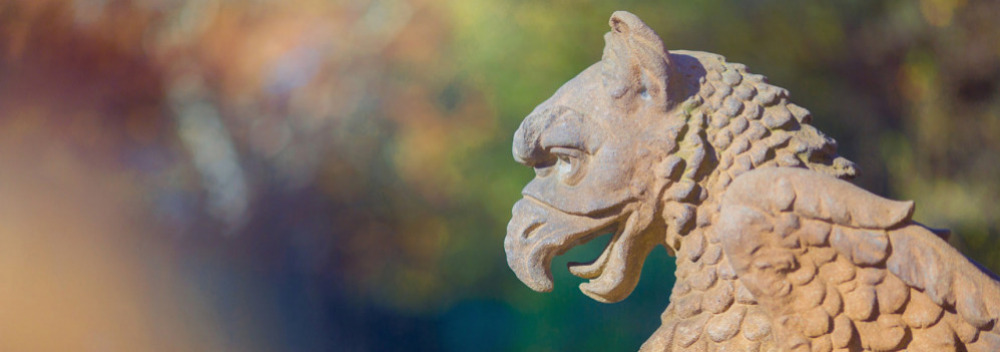
There is no place in the world, especially if it is unique in some way, where there are no interesting, exciting or spicy stories from the past. Hévíz has a few of these stories too...
Flavius Theodosius or the most famous legend about the origin of Lake Hévíz
According to the ancient legend about the birth of the lake and its healing powers, Flavius, a Roman boy, was brought up by a Christian nurse here in Pannonia. The boy was weak and of poor health but his father was a great military leader so the nurse prayed to Virgin Mary to help him. The Holy Virgin, hearing her prayer, caused a spring to gush forth, in the healing water of which the child was bathed every day. The hot water of the spring and the steaming mud made the child's body grow stronger and stronger. Later, the boy became the Emperor of Eastern Rome, Flavius Theodosius, who made Christianity the state religion of his empire in 391. Since then, the water of the spring has been feeding Lake Hévíz and has brought healing to many.
Dubius and Dubia, another story from Roman times
In Valcum (today it is called Fenékpuszta) there lived a fine old man, the 80-year-old Dubius, who was the scribe of the fortress. His wife was the limping and quarrelsome Dubia. Dubius was married to a real shrew. Old Dubia had rheumatism, perhaps that was the reason why she was so insufferable. One day Dubius was walking on the shore of a stinking lake nearby. He saw the forest animals going there, bathing their aching limbs in the water, and all at once jumping and skipping merrily out of the magic lake. So good old Dubius ran home urging his woman to go with him to the rejuvenating spring. And as it usually happens in such old stories: the old woman bathed only once in the water and her illness disappeared. She returned to her home happily and young.
The romantic legend of Sándor Rezi and Klára Pethő
The two main characters of this medieval story are Klára Pethő, daughter of the lord of Tátika Castle, and Sándor Rezi, captain of the castle of Csobánc. The two lords were enemies but Sándor Rezi fell in love with the beautiful Klára Pethő, whom he often saw leaning on her elbows on the battlements of the castle of Tátika. One day Sándor Rezi requested an audience with old Pethő and asked for permission to marry his daughter. However, Pethő challenged Sándor to a duel first. Since Sándor won, he could have his beautiful bride. Yet it was only at the wedding that he discovered that she was paralysed in both legs. After the wedding - on the advice of a gipsy woman - the newlyweds built their house on the shore of the “hot spring" so that the girl could bathe in the water regularly. A few weeks later, the girl was cured by the miraculous effect of the lake, and so they lived happily ever after.
The cherubs of the lake
The cherubs served the gods in the mythology of the ancient Semitic peoples. They stood outside the gates and kept evil spirits away. Their images were usually carved in stone on the gates of the palaces of kings or churches, which is probably why the Festetics family, the owners of the lake, had them made. According to a legend of Hévíz, if a person walks between the two cherubs without love in their heart, the cherubs start singing.
The fabulous but true story of Nelly the elephant
While in the 1800s it was quite natural to drive animals into the water, in 1914 it was rather a sensation when Nelly, the sore-legged elephant, was taken to Hévíz by the zoo's veterinarian for a medical cure. The elephant, who worked in a circus before, was prescribed bathing in medicinal water and mud twice a day, which she fulfilled with great enthusiasm in the lake and the stream. The 3-year-old elephant became so popular that she became an additional tourist attraction for the town and visitors treated her with baskets of delicacies, such as fresh cherries every day. Unfortunately, Nelly's wellness holiday came to an end when the war broke out.
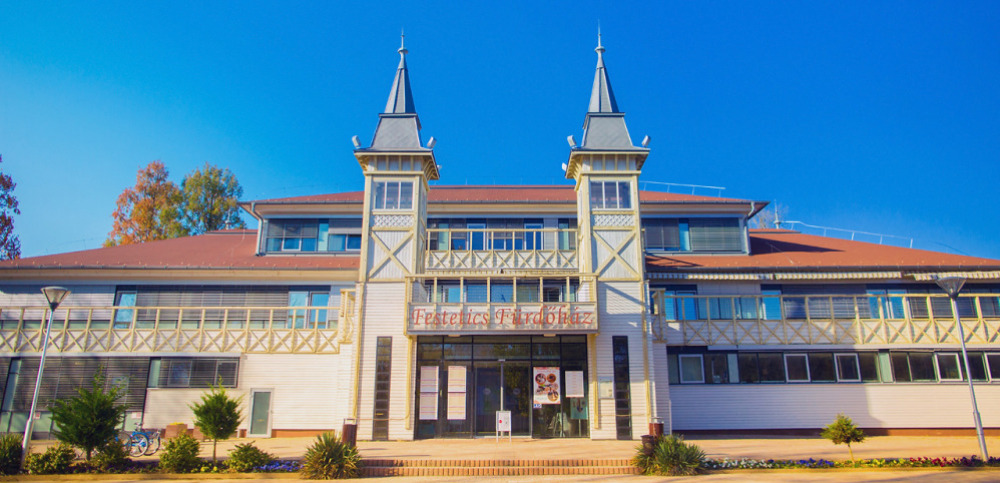
From 3 November 2025, Lake Hévíz can be accessed only via the entrance on Ady Street through the Festetics Day Spa.
Bathing is allowed only outdoors.
• Wellness area (the admission ticket includes the wellness usage fee)
• Vital Bar and Medio Buffet
• Covered rest areas in the section between Festetics Bathhouse and Vital Bar / Medio Buffet (“C” and “D” buildings)
• Outdoor shoreline section between the main entrance and the Festetics Day Spa (seasonally)
A limit is introduced on the accessible territories of the Lake Bath, which determines the simultaneous capacity of the facilities. For up‑to‑date information, please contact the information desk:
E‑mail: spaheviz@spaheviz.hu
Mobile: +36 30 959 1002
• Deák Square entrance
• Central Bathhouse (“A” building and “B” terrace)
• Northern water surface (between the “A” building and the Summer building)
Detailed information about the closure of the central Bathhouse (“A” building and “B” terrace) is available on www.spaheviz.hu.
Due to technical preparation work, phased closures on the water surface and shoreline are expected.
• Patient lift: at the outdoor seating pool (Vital Bar terrace, “C” Building )
Our staff provide assistance with the use of the patient lift.
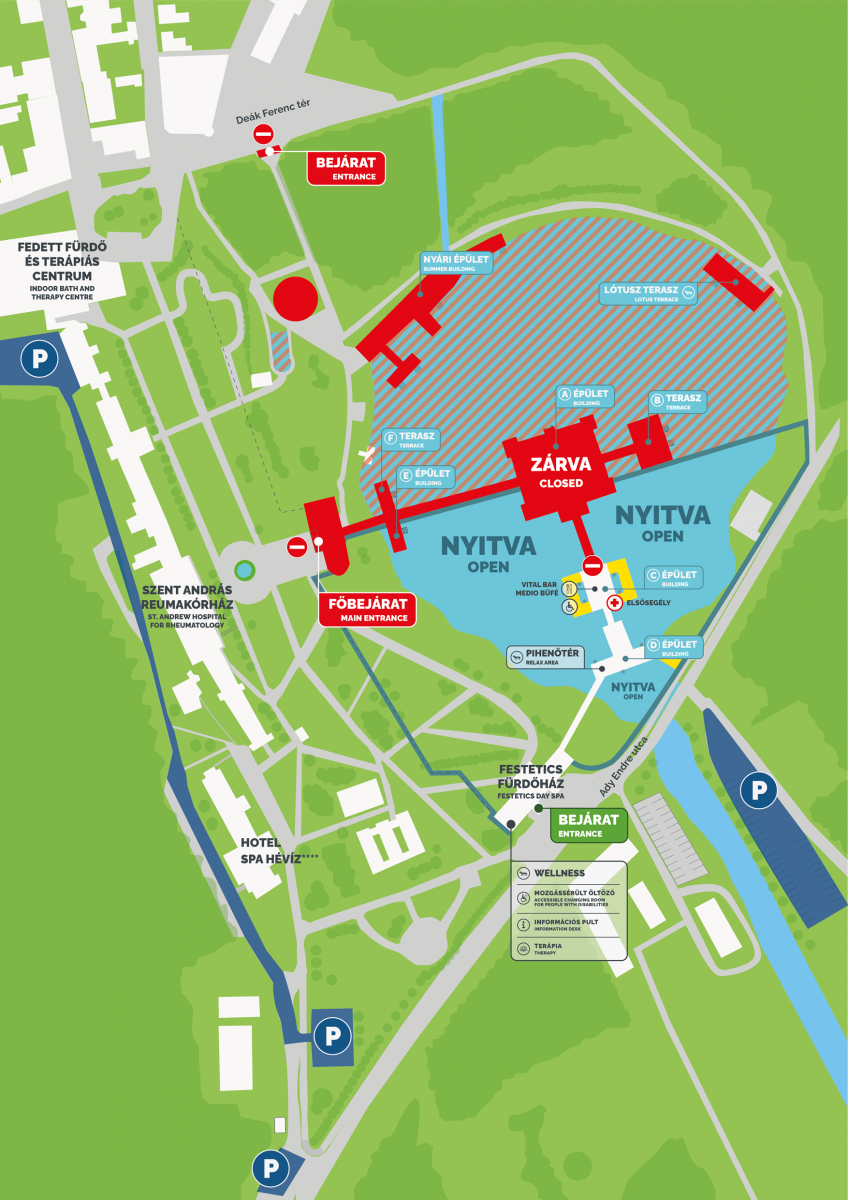
Yearly opening hours |
|||
| Opening | End of bathing and wellness time | Closing | |
| 2025.10.06. - 2025.10.25. | 9:00 | 17:00 | 17:30 |
| 2025.10.26. - 2026.02.08. | 8:30 | 16:00 | 16:30 |
| 2026.02.09. - 2026.03.29. | 9:00 | 17:00 | 17:30 |
Closing time on 24.12.2025 is at 14:00; on 31.12.2025 at 16:00. Opening time is at 11:00 on 01.01.2026.
Hévíz Lake Bath and Festetics Bathhouse price list
Valid from 03.11.2025 to 31.03.2026
2-hour admission + WELLNESS ACCESS |
|
| Valid only on the day of purchase – entitles to a one-time entry. Includes the use of the wellness area. An additional charge will be levied if the allotted time limit is exceeded. Additional time extension cannot be purchased after the time limit has expired. Admission for children under the age of 6 is free of charge. | |
| 2-hour admission | 3 000 HUF |
| 2-hour admission seniors - Available for individuals over the age of 60. Can be purchased upon prior presentation of a valid photo ID. | 2 500 HUF |
| 2-hour admission students - Available for individuals over the age of 14. Can be purchased upon prior presentation of a valid student card. | 2 500 HUF |
| 2-hour admission children - Available for children aged 6 to 14. | 1 500 HUF |
| 2-hour admission groups - Discounted 2-hour admission - available for groups of 20 people or more, if payed in one sum. | 2500 HUF/Person |
Memberships + WELLNESS ACCESS |
|
| 10-hour membership - Valid for 20 days (can be used on the day of purchase + 19 calendar days) - the pass grants entry twice per day. Includes the use of the wellness area. The deposit is refundable within 5 calendar days after the expiration date. | 13 000 Ft + 2 000 Ft deposit |
| 20-hour membership - Valid for 30 days (can be used on the day of purchase + 29 calendar days) - the pass grants entry twice per day. Includes the use of the wellness area. The deposit is refundable within 5 calendar days after the expiration date. | 23 000 Ft + 2 000 Ft deposit |
Other rates |
|
| + 1 hour extension - Usable for extending the 2-hour admission. Valid once per admission. | 1 500 HUF |
| Additional charge - For exceeding the allotted time limit, payable for every 30 minutes. | 1 000 HUF |
| Cloakroom - Operates seasonally - the fee applies per coat/package. | 300 HUF |
| Safety deposit box - Usage is free of charge. |
2000 HUF deposit |
| Swimring rental - Daily fee. | 700 HUF + 2 000 HUF deposit |
| Sauna towel | 500 HUF |
Online purchased tickets and gift vouchers can be redeemed at the information desk located in the Festetics Day Spa.
Gift vouchers purchased from 1 October 2025, can be redeemed between 1 April 2026 and 31 October 2026.
General information
- The depth of the lake is 2 to 38 m.
• We reserve the right to change prices and opening hours.
• The price of purchased tickets can not be refunded.
• Accepted means of payment: cash (HUF), bank card or SZÉP card.
• By purchasing admission to the lake area, visitors implicitly agree to adhere to the house rules.
• Admission for children under the age of 6 is free.
• Swimring rental is possible only with the purchase of a rental ticket and the payment of a deposit. The Bath refunds the deposit only, if the rented equipment is returned until the end of bathing time, on the day of rental. Payment is possible only in cash (in Hungarian Forint).
• The admission tickets include the use of the wellness area. Wellness and sauna services are available to individuals over 12 years of age only. For reasons of hygiene, one sauna towel is provided for each wellness admission.
• For more information, please contact the information counter at the Festetics Day Spa


